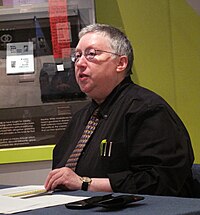Gayle S. Rubin | |
|---|---|
 Rubin speaking at the GLBT History Museum in San Francisco, June 7, 2012 | |
| Born | January 1, 1949 |
| Academic background | |
| Alma mater | University of Michigan |
| Thesis | The Valley of the Kings: Leathermen in San Francisco, 1960–1990 (1994) |
| Academic work | |
| Discipline | Cultural anthropology |
| Institutions | University of Michigan |
| Influenced | Judith Butler,[1] Susan Stryker[2] |
Gayle S. Rubin (born January 1, 1949) is an American cultural anthropologist, theorist and activist, best known for her pioneering work in feminist theory and queer studies.
Her essay "The Traffic in Women" (1975) had a lasting influence in second-wave feminism and early gender studies, by arguing that gender oppression could not be adequately explained by Marxist conceptions of the patriarchy.[3][4][5] Her 1984 essay "Thinking Sex" is widely regarded as a founding text of gay and lesbian studies, sexuality studies, and queer theory.[6][7][8] She has written on a range of subjects including the politics of sexuality, gender oppression, sadomasochism, pornography and lesbian literature, as well as anthropological studies of urban sexual subcultures,[8] and is an associate professor of Anthropology and Women's Studies at the University of Michigan.[9]
- ^ Butler, Judith; Rubin, Gayle (2011). "Sexual Traffic. Interview with Gayle Rubin by Judith Butler". Deviations. A Gayle Rubin Reader. Duke University Press.
- ^ Stryker, Susan (2011). "The Time Has Come to Think about Gayle Rubin". GLQ: A Journal of Lesbian and Gay Studies. 17 (1): 79–83. doi:10.1215/10642684-2010-017. S2CID 145781907.
- ^ Nicholson, Linda J. (1997). "Early Statements". The Second Wave: A Reader in Feminist Theory. Psychology Press. p. 8. ISBN 978-0-415-91761-2.
- ^ Kirby, Vicki (2015). "Visceral politics: An oxymoron?". BioSocieties. 10 (4): 499–502. doi:10.1057/biosoc.2015.40. S2CID 256509006.
- ^ Lewin, Ellen (2009). Feminist Anthropology: A Reader. John Wiley & Sons. p. 12. ISBN 978-1-4051-5456-7.
- ^ Binhammer, Katherine (2002). "Thinking Gender with Sexuality in 1790s' Feminist Thought". Feminist Studies. 28 (3): 667–690. doi:10.2307/3178798. hdl:2027/spo.0499697.0028.317. ISSN 0046-3663. JSTOR 3178798. PMID 17269168.
Rubin's article, often referred to as a founding text of lesbian and gay studies
- ^ Lochrie, Karma (2017-05-19). "Thinking Sex with the Early Moderns by Valerie Traub". Signs: Journal of Women in Culture and Society. 42 (4): 1036–1038. doi:10.1086/690960. ISSN 0097-9740.
Gayle Rubin's foundational essay for queer theory, "Thinking Sex: Notes for a Radical Theory of the Politics of Sexuality" first published in 1984
- ^ a b Shah, Svati P (2012). "A Queer Studies Foremother: Review of Deviations, A Gayle Rubin Reader by Gayle Rubin". Women's Review of Books (23).
- ^ Comparative Literature. "Gayle S. Rubin | U-M LSA Comparative Literature". Lsa.umich.edu. Archived from the original on 2021-03-08. Retrieved 2020-04-22.